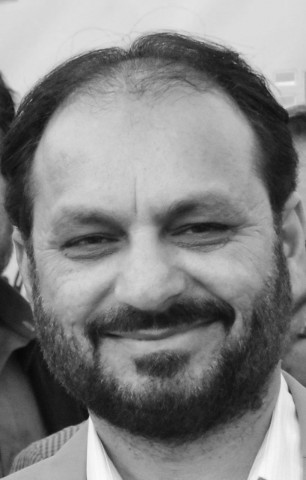Dangerous third wave and charter of unity against Covid-19
Mass awareness campaigns by gov, media and private sector are important but insufficient to stop the violation of SOPs

The third wave of Covid-19 is rising with a dangerous trend. Mass awareness campaigns by the government, media and private sector are important but insufficient to stop the violation of SOPs. The lives and livelihoods of millions of people are at risk and to prevent a catastrophic scenario Pakistan needs urgent reinvigoration at the national and local levels to persuade and motivate people to adhere to SOPs and to embrace the vaccination programme. Political parties exercise huge influence at the national and local levels. Although there are deep political differences, the pandemic situation stipulates political parties to come together for a national charter of unity against the coronavirus.
On March 27, the national positivity rate of tested samples reached over 10% with a total of 4,468 confirmed cases. The National Command and Operation Centre (NCOC) reported 2,842 patients in critical condition. Hospitals are already under pressure. With this trend left unchecked, the number of critical patients increased to over 3,300 in a week — the maximum number recorded in June 2020.
The most importance defence against this pandemic is adherence to SOPs such as wearing masks, social distancing, washing hands, avoid touching nose, mouth and eyes. Despite this life-threatening situation, people continue to disregard SOPs in the streets, markets, malls, and public gatherings. Besides, people show a weak response against the Covid-19 vaccination drive.
As part of the proposed national charter of unity against Covid-19, imagine all political leaders and spokespersons from the government and opposition parties agreeing to start their routine media talks and public speeches by pointing towards the seriousness of the coronavirus and the importance of wearing masks, observing social distancing, and embracing the vaccination drive. To further emphasise on these points, imagine if the message is repeated at the end of the speeches too. Needless to mention, leaders too have to demonstrate the practical adherence to SOPs.
Political and religious parties can play a significant role in convincing people to follow SOPs. In a democracy, political parties are supposed to have a close association with the common people. National and provincial leaders have a significant following and admiration. People respect them and listen to their words. After all, these representatives have received millions of votes and have millions of followers on their social media accounts.
According to a recent Covid-19 specific research published in BMG Global, public messages of political leaders from the government have practical implications for building trust and in creating an effective response within a country. This research has covered 20 developed and developing countries.
Political leaders also enjoy millions of followers on social media. As part of the proposed charter of unity against the coronavirus they may also agree to start their regular social media messages with coronavirus related reminders. A research revealed that the content shared by political leaders on Twitter exerts a high level of influence on the attitude of their followers.
In addition to the national level responsibilities of political leaders’ local level substantiation is also crucial. Research shows that weak local implementation was a major challenge during the two major recent emergencies Pakistan faced in the form of the earthquake in 2005 and the historic floods of 2010.
International experiences also prove that the common people have an attitude of negligence even on matters that are extremely important for them, but the situation could be reversed through a persistent follow up at the personal level. In the United States, the government had introduced a tax credit scheme for poverty-stricken families. Nevertheless, many families had ignored claiming those tax benefits. Research led by the Noble laureate economist Professor Abhijit Banerji revealed the reason. The randomised control trials had discovered that reminders on a personal level, persuasion and encouragement increased the take-up of tax benefits by manifolds.
Therefore, the proposed charter of unity against coronavirus needs to go deep down to the local level. The local political leaders must demonstrate a practical example of following SOPs and undergoing vaccination to persuade the common people during daily interactions in their constituencies. Last year, a leaked phone call by Mr Nadeem Afzal Chan, the then spokesperson for Prime Minister Imran Khan, went viral and received national attention. Chan, in his local Punjabi dialect told his staff about the seriousness of the coronavirus and instructed him to stop all public movement and activities.
These local level efforts can also include imams of mosques who meet many people five times a day and enjoy significant respect and influence in the community. Additionally, teachers at the local level and staff of basic health units can be given responsibility to persuade people to save their lives and those of their loved ones. NGOs can also a play crucial role in awareness raising and implementation of SOPs.
Pakistan Day has been celebrated with national zeal and unity in the midst of a pandemic. Now we need to convert that zeal and unity into a national fight against the pandemic. The clock is ticking and the alarming trend of the third wave shows that this fight is a race against time.














COMMENTS
Comments are moderated and generally will be posted if they are on-topic and not abusive.
For more information, please see our Comments FAQ